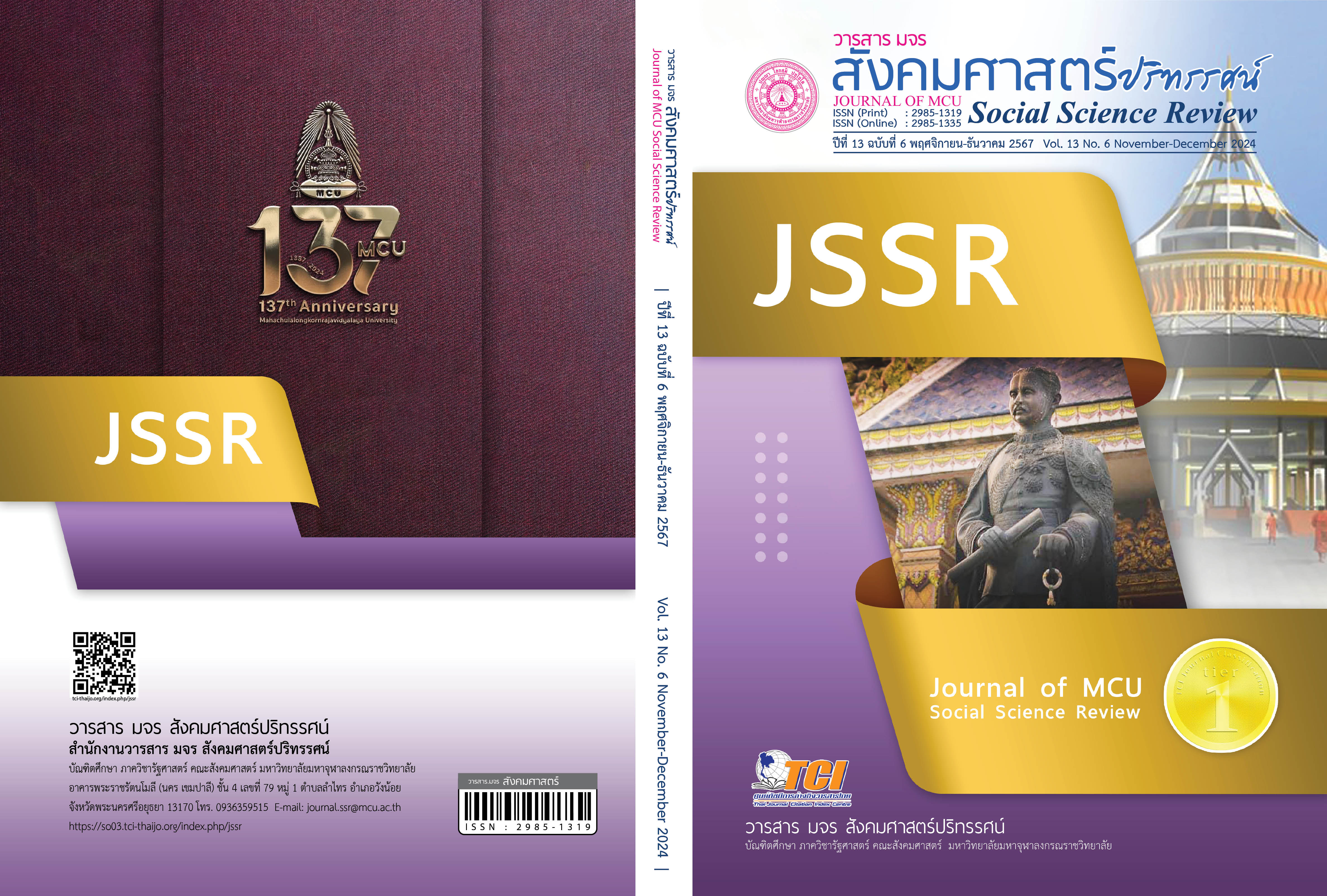การจัดการเรียนรู้แบบห้องเรียนกลับด้านร่วมกับการจัดการเรียนรู้แบบ 5E ที่มีต่อผลสัมฤทธิ์ทางการเรียนวิชาคณิตศาสตร์และความสามารถ ในการกำกับตัวเองของนักเรียนชั้นประถมศึกษาปีที่ 5
คำสำคัญ:
การจัดการเรียนรู้แบบห้องเรียนกลับด้าน, การจัดการเรียนรู้แบบ 5E, ผลสัมฤทธิ์ทางการเรียนวิชาคณิตศาสตร์, ความสามารถในการกำกับตัวเองในการเรียนบทคัดย่อ
บทความวิจัยนี้มีวัตถุประสงค์ 1. เปรียบเทียบผลสัมฤทธิ์ทางการเรียนก่อนและหลัง 2. ศึกษาความสามารถในการกำกับตัวเองของนักเรียนในการเรียน วิชาคณิตศาสตร์หลังได้รับการจัดการเรียนรู้แบบห้องเรียนกลับด้านร่วมกับการจัดการเรียนรู้แบบ 5E เป็นการวิจัยเชิงทดลอง กลุ่มตัวอย่างที่ใช้ในการวิจัยคือ นักเรียนชั้นประถมศึกษาปีที่ 5 จำนวน 20 คน ภาคเรียนที่ 2 ปีการศึกษา 2564 โรงเรียนบ้านคลองพระยา จังหวัดกระบี่ สังกัดสำนักงานเขตพื้นที่การศึกษาประถมศึกษากระบี่ วิเคราะห์ข้อมูลโดยการหาค่าเฉลี่ย ส่วนเบี่ยงเบนมาตรฐาน และการทดสอบหาค่าทีแบบ Dependent และหาค่าทีแบบ Samples Test
ผลการวิจัยพบว่า 1. ผลสัมฤทธิ์ทางการเรียนวิชาคณิตศาสตร์ หลังได้รับการจัดการเรียนรู้แบบห้องเรียนกลับด้านร่วมกับการจัดการเรียนรู้แบบ 5E สูงกว่าผลสัมฤทธิ์ทางการเรียนก่อนได้รับการจัดการเรียนรู้อย่างมีนัยสำคัญทางสถิติที่ระดับ .05 2. นักเรียนชั้นประถมศึกษา ปีที่ 5 ที่ได้รับการจัดการเรียนรู้แบบห้องเรียนกลับด้านร่วมกับการจัดการเรียนรู้แบบ 5E มีความสามารถในการกำกับตัวเองในการเรียนของนักเรียน อยู่ในระดับการปฏิบัติมาก โดยมีค่าเฉลี่ย เท่ากับ 3.69 คิดเป็นร้อยละ 73.80
เอกสารอ้างอิง
จิรารัตน์ กีฬา. (2565). การศึกษาผลการจัดการเรียนรู้วิทยาศาสตร์ เรื่อง ตัวเรา สัตว์และพืช โดยใช้กระบวนการสืบเสาะแสวงหาความรู้ของนักเรียนชั้นประถมศึกษาปีที่ 1. วารสารมหาจุฬาตานีปริทรรศน์, 4(8), 50-57.
ธนภรณ์ กาญจนพันธ์. (2559). ศึกษาผลการจัดการเรียนรู้แบบห้องเรียนกลับทางที่มีต่อผลสัมฤทธิ์ทางการเรียน วิชาชีววิทยา การกำกับตนเองและความพึงพอใจต่อการจัดการเรียนรู้ของนักเรียนชั้นมัธยมศึกษาปีที่ 5 (วิทยานิพนธ์ศึกษาศาสตรมหาบัณฑิต สาขาวิชาการสอนวิทยาศาสตร์และคณิตศาสตร์). สงขลา: มหาวิทยาลัยสงขลานครินทร์.
ปณิดา มัณยานนท์. (2554). การใช้การจดบันทึกคอร์เนลล์เพื่อส่งเสริมความสามารถในการอ่านภาษาอังกฤษและความสนใจของนักเรียนชั้นมัธยมศึกษาปีที่ 4 (วิทยานิพนธ์ศึกษาศาสตรมหาบัณฑิต สาขาวิชาการสอนภาษาอังกฤษ). เชียงใหม่: มหาวิทยาลัยเชียงใหม่.
พัชรกร ยิ่งยงยุทธ. (2560). การศึกษาความสามารถในการสร้างแบบจำลองทางวิทยาศาสตร์และ ผลสัมฤทธิ์ทางการเรียนของนักเรียนชั้นมัธยมศึกษาปีที่ 5 ที่ได้รับการจัดการเรียนรู้แบบสืบเสาะหาความรู้ 5 ขั้นตอนร่วมกับหลัก สุ จิ ปุ ลิ (วิทยานิพนธ์การศึกษามหาบัณฑิตสาขาวิชาวิทยาการทางการศึกษาและการจัดการเรียนรู้). กรุงเทพฯ: มหาวิทยาลัยศรีนครินทรวิโรฒ.
ระเบียบ อนันตพงศ์. (2550). ผลการใช้วิธีสอนแบบสืบเสาะหาความรู้ที่ 5 มีต่อผลสัมฤทธิ์ทางการเรียน เรื่อง สนามของแรง และทักษะกระบวนการทางวิทยาศาสตร์ขั้นผสมของนักเรียนชั้นมัธยมศึกษาปีที่ 5 โรงเรียนหาดใหญ่วิทยาลัยสมบูรณ์กุลกันยาจังหวัดสงขลา(วิทยานิพนธ์การศึกษามหาบัณฑิต สาขาวิชาหลักสูตรและการสอน). สงขลา: มหาวิทยาลัยทักษิณ.
วิจารณ์ พานิช. (2556). ครูเพื่อศิษย์ สร้างห้องเรียนกลับทาง (พิมพ์ครั้งที่ 2). กรุงเทพฯ: เอสอาร์พริ้นติ้งแมสโปรดักส์.
สถาบันส่งเสริมการสอนวิทยาศาสตร์และเทคโนโลยี. (2547). สรุปการศึกษาพัฒนารูปแบบการเรียนการสอนแบบสืบเสาะหาความรู้ (Inquiry Cycle หรือ 5E). กรุงเทพฯ: คุรุสภาลาดพร้าว.
_____. (2552). คู่มือการจัดการเรียนรู้ กลุ่มสาระการเรียนรู้คณิตศาสตร์. กรุงเทพฯ: สถาบันส่งเสริมการสอนวิทยาศาสตร์และเทคโนโลยี กระทรวงศึกษาธิการ.
_____. (2557). สรุปการศึกษาพัฒนารูปแบบการเรียนการสอนแบบสืบเสาะหาความรู้ (Inquiry Cycle หรือ 5E). กรุงเทพฯ: คุรุสภาลาดพร้าว.
สรรฤดี ดีปู่. (2554). การพัฒนาการจัดกิจกรรมการเรียนการสอนแบบสืบเสาะหาความรู้ (5Es) ในรายวิชา 4000101 วิทยาศาสตร์ในชีวิตประจำวัน (รายงานการวิจัย). เพชรบูรณ์: มหาวิทยาลัยราชภัฏเพชรบูรณ์.
สำนักงานเขตพื้นที่การศึกษาประถมศึกษากระบี่. (2564). ประกาศรูปแบบการจัดการเรียนการสอนในสถานการณ์การแพร่ระบาดของเชื้อไวรัสโคโรน่า (Covid-19). กระบี่: สำนักงานเขตพื้นที่การศึกษาประถมศึกษากระบี่.
สุภาวดี คำนาดี. (2551). การวิจัยและพัฒนากระบวนการกำกับตนเอง สำหรับการจัดการเรียนการสอนคณิตศาสตร์ เพื่อพัฒนาการรับรู้ความสามารถของตนเอง เจตคติและผลสัมฤทธิ์ทางการเรียนวิชาคณิตศาสตร์ของนักเรียนชั้นมัธยมศึกษาปีที่ 2. กรุงเทพฯ: จุฬาลงกรณ์มหาวิทยาลัย.
อรัญญา สถิตไพบูลย์. (2550). การพัฒนาทักษะการคิดวิจารณญาณและผลสัมฤทธิ์ทางการเรียนวิชาเคมีของนักเรียนระดับชั้นมัธยมศึกษาปีที่ 5 โดยใช้กระบวนการเรียนรู้แบบสืบเสาะหาความรู้ (วิทยานิพนธ์ศึกษาศาสตรมหาบัณฑิต สาขาวิชาหลักสูตรและการสอน). ขอนแก่น: มหาวิทยาลัยขอนแก่น.
ดาวน์โหลด
เผยแพร่แล้ว
รูปแบบการอ้างอิง
ฉบับ
ประเภทบทความ
สัญญาอนุญาต
ลิขสิทธิ์ (c) 2024 วารสาร มจร สังคมศาสตร์ปริทรรศน์

อนุญาตภายใต้เงื่อนไข Creative Commons Attribution-NonCommercial-NoDerivatives 4.0 International License.
เพื่อให้เป็นไปตามกฎหมายลิขสิทธิ์ ผู้นิพนธ์ทุกท่านต้องลงลายมือชื่อในแบบฟอร์มใบมอบลิขสิทธิ์บทความให้แก่วารสารฯ พร้อมกับบทความต้นฉบับที่ได้แก้ไขครั้งสุดท้าย นอกจากนี้ ผู้นิพนธ์ทุกท่านต้องยืนยันว่าบทความต้นฉบับที่ส่งมาตีพิมพ์นั้น ได้ส่งมาตีพิมพ์เฉพาะในวารสาร มจร สังคมศาสตร์ปริทรรศน์ เพียงแห่งเดียวเท่านั้น หากมีการใช้ภาพหรือตารางหรือเนื้อหาอื่นๆ ของผู้นิพนธ์อื่นที่ปรากฏในสิ่งตีพิมพ์อื่นมาแล้ว ผู้นิพนธ์ต้องขออนุญาตเจ้าของลิขสิทธิ์ก่อน พร้อมทั้งแสดงหนังสือที่ได้รับการยินยอมต่อบรรณาธิการ ก่อนที่บทความจะได้รับการตีพิมพ์ หากไม่เป็นไปตามข้อกำหนดเบื้องต้น ทางวารสารจะถอดบทความของท่านออกโดยไม่มีข้อยกเว้นใดๆ ทั้งสิ้น





